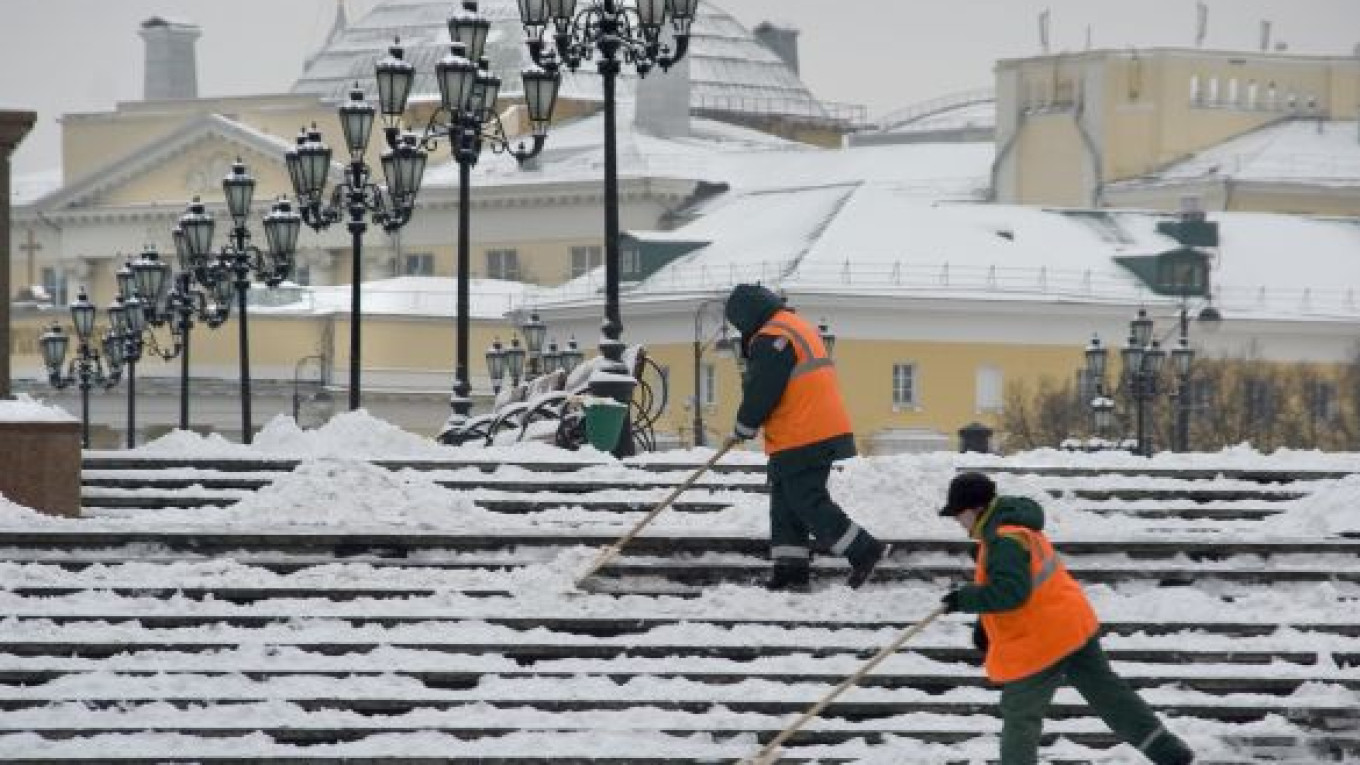Mayor Yury Luzhkov, known for his attempts to control both the rain and the snow, lambasted weather forecasters Tuesday for failing to predict this winter’s first big snowfall, which caused traffic jams that even stunned drivers used to Moscow’s notoriously crowded streets.
The mayor “is extremely dissatisfied with the work of the [city] meteorological office, which was unable to make an exact forecast even on a short-term basis,” Luzhkov’s spokesman Sergei Tsoi said, Interfax reported.
Some 15 centimeters of snow fell from Monday afternoon through early Tuesday, while the weather forecast delivered on Monday morning had predicted just 1.2 centimeters, Tsoi said.
City traffic ground to a halt during the evening rush hour, causing spectacular snarl-ups along the major ring roads and forcing desperate drivers to abandon their cars near metro stations. Eyewitnesses reported that cars were even left standing on the eight-lane Garden Ring.
Vendors walked through the chockablock traffic with jerrycans, selling fuel at revved-up prices, Noviye Izvestia reported.
Traffic police registered close to 2,700 accidents, roughly twice the usual amount.
The Internet was full of angry motorists’ complaints that city authorities had failed to prepare for winter even in the first week of December.
“It took me 7 1/2 hours to get home at 1:30 a.m.,” a blogger named Neorumancer wrote on his LiveJournal page. “I drove 30 kilometers along the Moscow Ring Road without seeing a single snowplow.”
But City Hall officials said it was senseless to dispatch the city’s more than 6,000-strong fleet of gritters and snowplows during peak hours and instead demanded an apology from meteorologists.
“I can understand such emotions well, but how can our snow-removal vehicles get on roads that are totally blocked by traffic?” Igor Pergamenshchik, spokesman for the municipal services department, told The Moscow Times.
Pyotr Biryukov, the first deputy mayor who oversees the department, said it was solely the meteorologists who had blundered and the city could easily cope with the snow. “Europe comes to a standstill with 5 centimeters snow, and in China the army and the whole population is mobilized at 8 centimeters. We sent out just 30,000 municipal workers with shovels,” he said, Interfax reported.
Biryukov said it would take at least a week to remove the snow, which he said amounted to 13.5 billion cubic meters.
Biryukov demanded “serious consequences” for Alexei Lyakhov, director of the city’s meteorological service, saying he was responsible for the blunder.
“I recommend that he apologize to the municipal services and Muscovites for the inaccurate forecast,” he said.
Meteorologists, however, said no weather forecast was perfect. “We did not expect such a strong snowfall. … But, sadly, forecasts can never be 100 percent accurate,” Lyakhov said on Vesti-24 state television. He said his agency would review its methods.
Tatyana Poznyakova, a department head in the meteorological service, said Monday’s snowfall was caused by an extremely rare weather phenomenon that was impossible to foretell. “We had a high-altitude high pressure system, something that we have only recorded twice in the past 50 years. There is no model in the world that could forecast this,” Poznyakova told The Moscow Times.
City officials hinted that they might put financial pressure on the meteorologists. “The traffic will be costly for the city, which also finances the meteorological service,” Tsoi said.
Luzhkov promised in September that the city would save money on snow removal this year by using special planes to blast clouds from the sky in the event of pending large snowfall.
Luzhkov’s announcement angered the surrounding Moscow region, where officials warned that they would have to cope with the extra snow.
But Biryukov said Tuesday that the plan, which costs 180 million rubles ($6 million), would only reach the experimental phase in February.
Luzhkov has long championed spraying liquid nitrogen, silver or cement particles into clouds, forcing precipitation to fall before it can reach the city center and spoil public holidays like Victory Day and City Day.
But meteorologists say it is difficult to conduct effective cloud blasting for an area as big as the whole city.
A Message from The Moscow Times:
Dear readers,
We are facing unprecedented challenges. Russia's Prosecutor General's Office has designated The Moscow Times as an "undesirable" organization, criminalizing our work and putting our staff at risk of prosecution. This follows our earlier unjust labeling as a "foreign agent."
These actions are direct attempts to silence independent journalism in Russia. The authorities claim our work "discredits the decisions of the Russian leadership." We see things differently: we strive to provide accurate, unbiased reporting on Russia.
We, the journalists of The Moscow Times, refuse to be silenced. But to continue our work, we need your help.
Your support, no matter how small, makes a world of difference. If you can, please support us monthly starting from just $2. It's quick to set up, and every contribution makes a significant impact.
By supporting The Moscow Times, you're defending open, independent journalism in the face of repression. Thank you for standing with us.
Remind me later.


